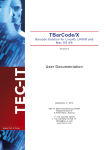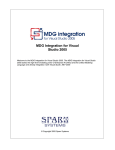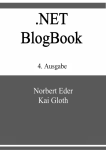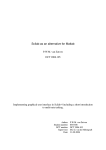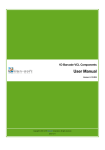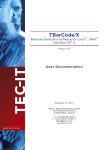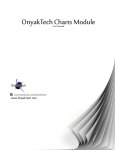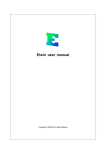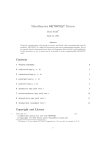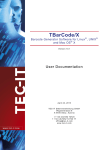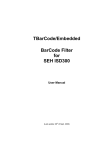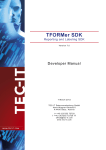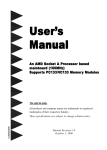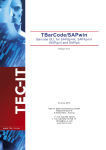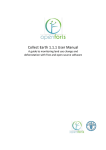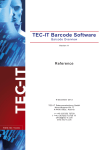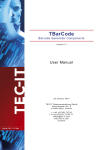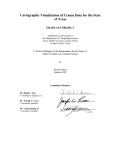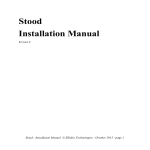Download TBarCode .NET Developer Manual V11
Transcript
TBarCode .NET Barcode Library for .NET V ers io n 1 1 29 J an u ar y 2 01 3 T EC- IT Da te n v er arb e it un g G m bH Ha ns -W agner - Str . 6 A- 44 0 0 S te yr , A us t ri a t + + 43 ( 0)7 2 52 72 7 20 f + + 43 ( 0)7 2 52 72 7 20 77 of f ic e @ tec - i t.c om ww w. tec - i t.c om T Bar Cod e f or . N ET D ev e lop er M anu al 1 Content 1 Content 2 2 Disclaimer 3 3.1 3.2 3.3 3.4 Introduction What is TBarCode SDK? What is TBarCode .NET? Scope of this Document Restrictions of the Demo Version 4 4 4 4 4 4.1 4.1.1 4.1.2 4.2 4.2.1 Installation Requirements Operating Systems .NET Version / IDEs Download and Setup Installation Path 5 5 5 5 5 5 5.1 5.2 5.3 5.4 5.5 5.6 5.7 Barcode Form Control Introduction Create or Open a Project Reference the Barcode Controls Add Barcode to a Form Adjust Properties Finally – Run the application API Reference 6 6 6 7 8 8 9 9 6.1 6.2 6.3 6.4 6.5 6.6 6.7 6.7.1 6.8 Barcode Web-Control Introduction Create/Open a Website Reference the Barcode Controls Add Barcode to Form Adjust Properties Finally – Preview Web Page in Browser Known Problems Error when resizing the control or changing a property API Reference 11 11 11 11 13 14 14 15 15 15 7.1 7.2 7.3 7.4 7.4.1 7.4.2 7.5 7.6 7.6.1 7.7 Barcode Class Introduction Create a new Project Add Reference to TBarCode Render Barcodes Add Barcode Object Write custom OnPaint-Method Finally – Run the application Build Errors Visual Studio 2010 with .NET 4 Client Profile API Reference 16 16 16 17 18 18 18 19 19 19 21 8.1 8.2 How to license TBarCode License Types License TBarCode 22 22 22 9.1 9.2 9.2.1 9.2.2 9.2.3 Redistributing TBarCode Dependencies Redistribution Visual C++ 2010 SP1 Runtime Using the MSI installer from TEC-IT Why Platform Specific Versions? 23 23 23 23 24 24 Contact and Support Information 25 3 4 5 6 7 8 9 10 Appendix A : A.1 A.2 A.3 A.4 Related Downloads Barcode Reference Samples User Manual FAQ – Frequently Asked Questions 26 26 26 26 26 Page 2 of 26 T Bar Cod e f or . N ET D ev e lop er M anu al 2 Disclaimer The actual version of this product (document) is available as is. TEC-IT declines all warranties which go beyond applicable rights. The licensee (or reader) bears all risks that might take place during the use of the system (the documentation). TEC-IT and its contractual partners cannot be penalized for direct and indirect damages or losses (this includes non-restrictive, damages through loss of revenues, constriction in the exercise of business, loss of business information or any kind of commercial loss), which is caused by use or inability to use the product (documentation), although the possibility of such damage was pointed out by TEC-IT. We reserve all rights to this document and the information contained therein. Reproduction, use or disclosure to third parties without express authority is strictly forbidden. Für dieses Dokument und den darin dargestellten Gegenstand behalten wir uns alle Rechte vor. Vervielfältigung, Bekanntgabe an Dritte oder Verwendung außerhalb des vereinbarten Zweckes sind nicht gestattet. © 1998-2013 TEC-IT Datenverarbeitung GmbH Hans-Wagner-Str. 6 A-4400 Austria t.: +43 (0)7252 72720 f.: +43 (0)7252 72720 77 http://www.tec-it.com Page 3 of 26 T Bar Cod e f or . N ET D ev e lop er M anu al 3 Introduction 3.1 What is TBarCode SDK? TBarCode SDK is a set of professional tools for the generation of barcodes. More than 100 different symbologies (linear barcodes, 2D barcodes and stacked barcode variants) can be printed or exported as graphics files. All industry formats are supported. The barcodes can be generated in the highest possible resolution and quality. TBarCode SDK is available in several versions for different operating systems, applications and programming environments. The following versions are included in this setup: TBarCode .NET A barcode .NET library for software developers. It includes a bar code class and barcode controls for Windows Forms and ASP.NET 2.0. TBarCode OCX A Microsoft® ActiveX® compliant barcode control. It can be used with Microsoft® Office applications and for software development. TBarCode Library A bar code DLL for Windows platforms for software developers. (A DLL for Windows CE/Windows Mobile is available on request. Please contact us with your platform details.) 3.2 What is TBarCode .NET? TBarCode .NET is .NET library for barcode generation. This library contains a .NET class for creating or printing bar codes a Barcode Control for Windows Forms a Barcode Control for ASP.NET 2.0 Web Applications 3.3 Scope of this Document This document explains how you can add barcodes to your .NET projects with TBarCode .NET. The complete API (application programming interface) is described in the TBarCode .NET Developer Reference. 3.4 Restrictions of the Demo Version In the demo version the barcodes will be drawn with a demo-hint. That means that the word “Demo” or the phrase “www.tec-it.com” is drawn partially over the barcode. The demo-hint does not influence the readability of the barcode in a negative way. ► In special cases (e.g. very small or high-resolution barcodes) you may want to test the product without demo restrictions. Please contact [email protected] for a temporary license key. ► For enabling the full-featured version (without the demo hints) you can obtain a license key from TEC-IT (http://www.tec-it.com/order/). ► For more information on licensing TBarCode, please refer to chapter 8. Page 4 of 26 T Bar Cod e f or . N ET D ev e lop er M anu al 4 Installation 4.1 Requirements 4.1.1 Operating Systems The following operating systems are supported: 4.1.2 Microsoft Windows XP SP2 Microsoft Windows Server 2003 Microsoft Windows Vista Microsoft Windows Server 2008 / 2008R2 / 2011 Microsoft Windows 7 Microsoft Windows 8 Microsoft Windows Server 2012 .NET Version / IDEs TBarCode .NET requires .NET Framework 2.0 or higher. It can be used with all IDEs supporting .NET 2.x (like Microsoft Visual Studio 20051 or newer). 4.2 Download and Setup Download TBarCode SDK from http://www.tec-it.com/Download ► TBarCode SDK and execute the setup application. Depending on your selection one or more of the following components are installed – along with documentations and sample applications: TBarCode .NET For .NET developers. Developer manual and API reference are included in the setup. TBarCode OCX A barcode ActiveX control for Microsoft Office users and for software developers. User manual and API reference are included in the setup. TBarCode Library For software developers. Developer manual and API reference are included in the setup. ► Administrative rights are required to install TBarCode SDK. ► TBarCode OCX is an ActiveX control. ActiveX controls must be registered within the Microsoft Windows operating system before they can be used. This registration is executed automatically by the setup application. On demand you can register the OCX file manually with the command line tool “regsvr32.exe”. 4.2.1 Installation Path The default installation path of the library files is: C:\Program Files\Common Files\TEC-IT\TBarCode\11.0 Please note that the x64 setup installs also a 32 bit version of the Barcode Library to C:\Program Files (x64)\Common Files\TEC-IT\TBarCode\11.0 1 VS2003 is not supported because it uses .NET 1.1 Page 5 of 26 T Bar Cod e f or . N ET D ev e lop er M anu al 5 Barcode Form Control 5.1 Introduction This chapter explains how to insert a barcode into a .NET Windows Form. TBarCode SDK contains a Windows Form control called BarcodeControl, which can easily be added to any .NET form. Requirements to work through the tutorial: TBarCode 11 installed. Visual Studio 2005 or a Visual Studio 2005 Express Edition 2 or newer versions. Basic knowledge about any .NET language (VB.NET, C#, etc.) 5.2 Create or Open a Project Start Visual Studio and open an existing Windows Forms project or create a new project: 1. Select File ► New ► Project… 2. Choose Windows Forms Application and click Ok. Figure 1: Create a New Project 2 The Visual Studio Express Editions are free development environments form Microsoft. Visit http://msdn.microsoft.com/vstudio/express/default.aspx to find out more. Page 6 of 26 T Bar Cod e f or . N ET D ev e lop er M anu al 5.3 Reference the Barcode Controls To work with the barcode controls, you first need to add them into Visual Studio: 1. Open the Toolbox . 2. Right-click All Windows Forms and select Choose Items… Figure 2: The Toolbox Context Menu. 3. In the Choose Toolbox Items dialog click the Browse… button. 4. In the Open dialog navigate to C:\Program Files\Common Files\TEC-IT\TBarCode\11.x (or the path you have chosen during setup). On Windows x64 systems you should add the 32 bit version of TBarCode in C:\Program Files (x86)\Common Files\TEC-IT\TBarCode\11.x – otherwise you may get the error “not a Microsoft .Net module”3. 5. Select TECIT.TBarCode.dll and click Open. 6. Two new controls named BarcodeControl should now show up in the Choose Toolbox Items dialog. Make sure they are checked and click Ok. 3 Since Visual Studio itself is compiled as a 32 bit application you should reference the x86 version of TBarCode when adding TBarCode to the Toolbox. This limitation applies to the Windows Forms Control in the Toolbox only. Page 7 of 26 T Bar Cod e f or . N ET D ev e lop er M anu al Figure 3: The Choose Toolbox Items Dialog with BarcodeControls. 5.4 Add Barcode to a Form Now, simply drag and drop the BarcodeControl from the Toolbox onto your Windows form. Figure 4: Toolbox with BarcodeControl. 5.5 Adjust Properties The barcode is now visible on your Windows Form. You can change the appearance (position and size) in the design view. Page 8 of 26 T Bar Cod e f or . N ET D ev e lop er M anu al To change more barcode properties: 1. Right-click the barcode control and select Properties. 2. Visual Studio’s Properties dialog appears. In the Properties dialog you can adjust the barcode properties, such as barcode type, check digit method, module width, etc. Figure 5: Windows Form with Barcode Control. 5.6 Finally – Run the application You have to click Start Debugging to run the application. 5.7 API Reference The API documentation of the BarcodeControl can be found in the „TBarCode .NET 11 Developer Reference”. The Windows Form control is contained in the namespace TECIT.TBarCode.Windows. Page 9 of 26 T Bar Cod e f or . N ET D ev e lop er M anu al Figure 6: Screenshot of TBarCode .NET 11 Developer Reference. Page 10 of 26 T Bar Cod e f or . N ET D ev e lop er M anu al 6 Barcode Web-Control 6.1 Introduction This chapter explains how to insert a barcode into an ASP.NET web site. TBarCode SDK contains a web control called BarcodeControl, which can easily be added to any ASP.NET page. Requirements to work through the tutorial: TBarCode 11 installed. Visual Studio 2005 or a Visual Studio 2005 Express Edition or newer versions. Basic knowledge about any .NET language (VB.NET, C#, etc.) 6.2 Create/Open a Website Start Visual Studio and open an existing ASP.NET web project or create a new one: 1. Select File ► New ► Project… 2. Choose ASP.NET Web Forms Application and click OK. Figure 7: Create a New Project 6.3 Reference the Barcode Controls To work with the barcode controls, you first need to add them into Visual Studio: 1. Open the Toolbox . 2. Right-click Standard and select Choose Items… Page 11 of 26 T Bar Cod e f or . N ET D ev e lop er M anu al Figure 8: The Toolbox Context Menu. 3. In the Choose Toolbox Items dialog click the Browse… button. 4. In the Open dialog navigate to C:\Program Files\Common Files\TEC-IT\TBarCode\11.x (or the path you have chosen during setup). On Windows x64 systems you should add the 32 bit version of TBarCode in C:\Program Files (x86)\Common Files\TEC-IT\TBarCode\11.x – otherwise you may get the error “not a Microsoft .Net module”4. 5. Select TECIT.TBarCode.dll and click Open. 6. Two new controls named BarcodeControl should show up in the Choose Toolbox Items dialog. Make sure they are checked and click OK. 4 Since Visual Studio itself is compiled as a 32 bit application you should reference the x86 version of TBarCode when adding TBarCode to the Toolbox. This limitation applies to the Web Control in the Toolbox only. Page 12 of 26 T Bar Cod e f or . N ET D ev e lop er M anu al Figure 9: The Choose Toolbox Items Dialog with BarcodeControls. 6.4 Add Barcode to Form Now, simply drag and drop the BarcodeControl from the Toolbox onto your ASPX page. A placeholder appears where the barcode will be rendered. Figure 10: BarcodeControl (Place-Holder) on ASPX page. Page 13 of 26 T Bar Cod e f or . N ET D ev e lop er M anu al 6.5 Adjust Properties The barcode placeholder is now visible on your ASPX page. You can change the appearance (position and size) in the design view. To change more barcode properties: 1. Right-click the barcode control and select Properties. 2. Visual Studio’s Properties dialog appears. In the Properties dialog you can adjust the barcode properties, such as barcode type, check digit method, module width, etc. Figure 11: Properties of Barcode Control. 6.6 Finally – Preview Web Page in Browser Please click Start Debugging to preview the web page in the browser. Figure 12: Web-Page with Barcode Control. Page 14 of 26 T Bar Cod e f or . N ET D ev e lop er M anu al 6.7 Known Problems 6.7.1 Error when resizing the control or changing a property When resizing the control in design mode or changing a property of the bar code control you may receive the following error message when building or running the project: Parser Error Message: Cannot create an object of type 'System.Drawing.RectangleF' from its string representation '{X=0,Y=0,Width=0,Height=0}' for the 'TextPosition' property. As a workaround you have to remove the TextPosition attribute from the controls ASPX markup. <Barcode … TextPosition="{X=0,Y=0,Width=0,Height=0}" 6.8 API Reference The API documentation of the BarcodeControl can be found in the „TBarCode .NET 11 Developer Reference”. The web control is contained in the namespace TECIT.TBarCode.Windows. Figure 13: Screenshot of TBarCode .NET 11 Developer Reference. Page 15 of 26 T Bar Cod e f or . N ET D ev e lop er M anu al 7 Barcode Class 7.1 Introduction TBarCode SDK not only provides a Windows Form Control and a Web Control to generate barcodes. The core functions are implemented in the Barcode class. This class can be used to generate barcodes in any type of application (e.g. in a Windows Forms application, on web site, in console applications, etc.). Here is a brief tutorial on how to render a barcode using the Barcode class. Requirements to work through the tutorial: TBarCode 11 installed. Visual Studio 2005 or a Visual Studio 2005 Express Edition or newer versions. Basic knowledge about the C# language. 7.2 Create a new Project Start Visual Studio and create a new project: 1. Select File ► New ► Project… 2. Choose Windows Forms Application and click Ok. Figure 14: Create a New Project Page 16 of 26 T Bar Cod e f or . N ET D ev e lop er M anu al 7.3 Add Reference to TBarCode In order to use the Barcode class, the project needs to reference the TECIT.TBarCode.dll: 1. In the Solution Explorer right-click References and choose Add Reference… 2. In the Add Reference dialog switch to the page Browse. 3. Navigate to the installation folder of TBarCode (usually C:\Program Files\Common Files\TEC-IT\TBarCode\11.x – see also 4.2.1). Note: The Windows x64 setup installs both versions, the 32 bit component and the 64 bit component. For x64 target platforms please reference the 64 bit component5. 4. Select TECIT.TBarCode.dll and click OK. Figure 15: Add Reference in Solution Explorer Figure 16: Add TECIT.TBarCode.dll as Reference 5 Please make sure to reference the correct version according to your platform target (see also 9.2.3). Page 17 of 26 T Bar Cod e f or . N ET D ev e lop er M anu al 7.4 Render Barcodes There are various ways to render a barcode using TBarCode. Here we will create a custom Paint()method that draws a barcode. 7.4.1 Add Barcode Object 7.4.2 Write custom OnPaint-Method 1. Right-click the form in Design View and select Properties. 2. In the Properties dialog select Events and double-click Paint (in the category Appearance) to create a custom Paint-method. Figure 17: Adding a Custom Paint-Event-Handler. 3. Now, we can use a Barcode object to render a barcode. Add the following lines of code (marked as bold): // C# Sample using using using using using using using using System; System.Collections.Generic; System.ComponentModel; System.Data; System.Drawing; System.Text; System.Windows.Forms; TECIT.TBarCode; Page 18 of 26 T Bar Cod e f or . N ET D ev e lop er M anu al namespace WindowsApplication1 { public partial class Form1 : Form { Barcode barcode; public Form1() { InitializeComponent(); SetStyle(ControlStyles.ResizeRedraw, true); MinimumSize = new Size(100, 100); // Initialize barcode barcode = new Barcode(); barcode.BarcodeType = BarcodeType.DataMatrix; barcode.Data = "Here is some random context for my sample barcode."; } private void Form1_Paint(object sender, PaintEventArgs e) { // Define the position and size of the barcode. Rectangle rectangle = this.ClientRectangle; rectangle.Inflate(-20, -20); barcode.BoundingRectangle = rectangle; // Draw the barcode barcode.Draw(e.Graphics); } } } In this sample we create a Data Matrix barcode, which is a 2-dimensional barcode variant. 7.5 Finally – Run the application Please click Start Debugging to run the application. The result can be seen in Figure 18. Figure 18: A Windows Form that renders a Barcode. 7.6 Build Errors 7.6.1 Visual Studio 2010 with .NET 4 Client Profile You may see an error that the TECIT namespace could not be found with the following warning: The referenced assembly "TECIT.TBarCode, Version=11.0.0.0, Culture=neutral, PublicKeyToken=1b5f4306b234b83d, processorArchitecture=x86" could not be resolved because it has a dependency on "System.Web, Version=4.0.0.0, Culture=neutral, PublicKeyToken=b03f5f7f11d50a3a" which is not in the currently targeted framework ".NETFramework,Version=v4.0,Profile=Client". Page 19 of 26 T Bar Cod e f or . N ET D ev e lop er M anu al This is because your project is using the .NET 4.0 client profile which does not include System.Web. Why is there a dependency on System.Web? The referenced TBarCode assembly file in your project contains also the Barcode Web Control. You actually need to reference the full framework to solve this issue. Change your target framework to .NET framework 4 in the project settings. Figure 19: Visual Studio Target framework settings See also MSDN How to: Target a Specific .NET Framework Version or Profile Troubleshooting .NET Framework Targeting Errors Page 20 of 26 T Bar Cod e f or . N ET D ev e lop er M anu al 7.7 API Reference The API documentation about the Barcode class can be found in the „TBarCode .NET 11 Developer Reference”. The class is contained in the namespace TECIT.TBarCode. Figure 20: Screenshot of TBarCode .NET 11 API Reference. Page 21 of 26 T Bar Cod e f or . N ET D ev e lop er M anu al 8 How to license TBarCode 8.1 License Types Please check out http://www.tec-it.com/order for available license types and pricing. 8.2 License TBarCode Without a valid license an additional text “Demo” is drawn across the barcode as shown in Figure 21. As soon as you have acquired a license, you can pass the license data to TBarCode, for example: barcode.License("John Smith", LicenseType.DeveloperOrWeb, 1, "00000000", TBarCodeProduct.Barcode1D); // 1D License barcode.License("John Smith", LicenseType.DeveloperOrWeb, 1, "00000000", TBarCodeProduct.Barcode2D); // 2D License Alternatively, you can set the license by using the license-properties of the barcode object. For example: barcode.Licensee = "John Smith"; barcode.LicenseType = LicenseType.DeveloperOrWeb; barcode.LicenseCount = 1; barcode.LicenseKey = "00000000"; barcode.LicensedProduct = TBarCodeProduct.Barcode1D; Figure 21: Barcode rendered without a valid License (Demo mode). Figure 22: Barcode rendered with a valid License. Page 22 of 26 T Bar Cod e f or . N ET D ev e lop er M anu al 9 Redistributing TBarCode This chapter explains what is important when redistributing a custom application that uses the TBarCode .NET controls. 9.1 Dependencies A .NET application that uses TBarCode SDK requires the following files: TECIT.TBarCode.dll This is a .NET assembly that contains the .NET controls. This file is mandatory. TBarCode11.dll This is a native Win32 (x86) library that performs barcode generation. This file is mandatory for 32-Bit applications (platform x86 or Any CPU on x86 systems). TBarCode11_x64.dll This is a native Win64 (x64) library that performs barcode generation. This file is mandatory for 64-Bit applications (platform x64 or Any CPU on x64 systems). zlib1.dll This is a 3rd-party library that performs data compression. This file is optional. It is only required, when data compression in barcodes is enabled. These files are located in the folder6 C:\Program Files\Common Files\TEC-IT\TBarCode\11.0 (or in the folder you have chosen during setup). Because we rely on native code, also the Visual C++ 2010 SP1 runtime components have to be installed on the computer. See next section how to distribute them with your application. The target .NET framework (.NET 2.0, 3.0, 3.5, 4) must be available on the target system. 9.2 Redistribution When redistributing a custom application the files described above need to be redistributed together with the application. The DLLs should be located in the same folder as the executable. Other files than those listed above must not be redistributed. For web applications, the DLLs should be placed in the bin directory of the web site. 9.2.1 Visual C++ 2010 SP1 Runtime You may also have to deploy the runtime components of Visual C++ 2010 SP1 along with your application and/or ensure they are installed on the target computer. There are two options to install them: You can install these components with the Microsoft Visual C++ 2010 SP1 Redistributable Package available at - 32 Bit (x86) version: http://www.microsoft.com/en-us/download/details.aspx?id=8328 - 64 Bit (x64) version: http://www.microsoft.com/en-us/download/details.aspx?id=13523 The package installs all required runtime DLLs. 6 On Windows x64 this path contains the 64 Bit component. For the 32 Bit component see C:\Program Files (x86)\... Page 23 of 26 T Bar Cod e f or . N ET D ev e lop er M anu al If you use a setup tool and your installer supports merge modules (*.msm files) you can add the required msm packages to your setup: - 32 Bit (x86) - Microsoft_VC100_CRT_x86.msm - 64 Bit (x64) - Microsoft_VC100_CRT_x64.msm 9.2.2 Using the MSI installer from TEC-IT As an alternative for distributing the required files along with your application you can install TBarCode .NET from the TBarCode SDK MSI installer available from our web site. When using the MSI installer from TEC-IT you also have the option for a silent setup – see FAQ TBarCode SDK Distribution - How To Create a Silent Setup. The MSI installer contains also the Visual C++ 2010 SP1 runtime files (but no .NET framework!). It registers the .NET assemblies in the GAC and extends the PATH environment variable so that all native DLL dependencies are found. ► At least for web applications the MSI installer may be a convenient option. Make sure to restart IIS (admin console command “iisreset”) in order to update the DLL search path. ► Please contact TEC-IT Support if you need further assistance. 9.2.3 Why Platform Specific Versions? Why do we use or offer two different TEC-IT.TBarCode.dll files, one with platform x86 and one with platform x64? Why is there no version with platform “Any CPU”? TBarCode .NET internally relies on the TBarCode Library, which is a native code DLL - it is loaded on demand in the background. In order to support both 32 bit and 64 bit platforms we have two different versions of TBarCode Library (TBarCode11.dll and TBarcode11_x64.dll) and therefore also two different platform targets for the TEC-IT.TBarCode.dll .NET assembly. Page 24 of 26 T Bar Cod e f or . N ET D ev e lop er M anu al 10 Contact and Support Information TEC-IT Datenverarbeitung GmbH Address: Phone: Fax: Email: Hans-Wagnerstr. 6 AT-4400 Steyr Austria/Europe +43 / (0)7252 / 72 72 0 +43 / (0)7252 / 72 72 0 – 77 [email protected] Web: http://www.tec-it.com FAQ: http://www.tec-it.com/support/faq/tbarcode/Default.aspx AIX® is a registered trademark of IBM Corporation. HTML, DHTML, XML, XHTML are trademarks or registered trademarks of W3C, World Wide Web Consortium, Laboratory for Computer Science NE43-358, Massachusetts Institute of Technology, 545 Technology Square, Cambridge, MA 02139. JAVA® is a registered trademark of Sun Microsystems, Inc., 901 San Antonio Road, Palo Alto, CA 94303 USA. JAVASCRIPT® is a registered trademark of Sun Microsystems, Inc., used under license for technology invented and implemented by Netscape. Linux® is a registered trademark of Linus Torvalds in several countries. Microsoft®, Windows®, Microsoft Word®, Microsoft Excel® are registered trademarks of Microsoft Corporation. Navision is a registered trademark of Microsoft Business Solutions ApS in the United States and/or other countries. Oracle® is a registered trademark of Oracle Corporation. PCL® is a registered trademark of the Hewlett-Packard Company. PostScript® is a registered trademark of Adobe Systems Inc. SAP, SAP Logo, R/2, R/3, ABAP, and SAPscript are trademarks or registered trademarks of SAP AG in Germany (and in several other countries). UNIX® is a registered trademark of The Open Group All other products mentioned are trademarks or registered trademarks of their respective companies. If any trademark on our web site or in this document is not marked as trademark (or registered trademark), we ask you to send us a short message ([email protected]). Page 25 of 26 T Bar Cod e f or . N ET D ev e lop er M anu al Appendix A: Related Downloads A.1 Barcode Reference The document “Barcode Reference” provides an overview over supported barcode types and gives additional information on how to use them. The following issues are discussed: Supported barcode symbologies (with detailed information on each barcode type) Check digits (general information and available check digits methods) Print ratio and ratio hints (or Ratio Format) Format strings Escape sequences and control characters Application Identifiers MaxiCode and UPS standards The Barcode Reference is available as separate document on the TEC-IT web-site http://www.tecit.com ► Support ► Knowledge Base The direct URL is as follows: http://www.tec-it.com/download/PDF/Barcode_Reference_EN.pdf. A.2 Samples TEC-IT provides a number of sample applications which allow customers to start with the development of their own applications and/or documents as fast as possible. Sample applications are included in the TBarCode11 setup (Start Menu: TEC-IT TBarCode 11 ► Examples) or can be downloaded from the TEC-IT web site http://www.tec-it.com (download area). ► Make sure TBarCode SDK was installed before trying to run any sample application! A.3 User Manual For user of Microsoft Office one additional document Is provided: User Manual A description on how to use TBarCode OCX (the Microsoft ActiveX compliant Barcode Control) in applications which are part of Microsoft Office. Microsoft Word, Microsoft Excel, Microsoft Access and Microsoft InfoPath are discussed API Reference A detailed description of the TBarCode interface (methods, properties, enumerations and events). These documents are included in the setup (Start Menu: TEC-IT TBarCode 11 ► Manuals). A.4 FAQ – Frequently Asked Questions Check out the FAQ on our web site http://www.tec-it.com/support/faq/tbarcode/Default.aspx. Page 26 of 26


























